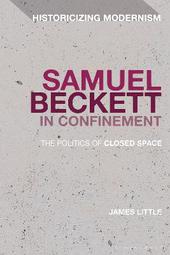
|
Samuel Beckett in Confinement: The Politics of Closed Space
Hardback
Main Details
Description
Confinement appears repeatedly in Samuel Beckett's oeuvre - from the asylums central to Murphy and Watt to the images of confinement that shape plays such as Waiting for Godot and Endgame. Drawing on spatial theory and new archival research, Beckett in Confinement explores these recurring concepts of closed space to cast new light on the ethical and political dimensions of Beckett's work. Covering the full range of Beckett's writing career, including two plays he completed for prisoners, Catastrophe and the unpublished 'Mongrel Mime', the book shows how this engagement with the ethics of representing prisons and asylums stands at the heart of Beckett's poetics.
Author Biography
James Little is a postdoctoral researcher at Charles University, Prague and Visiting Professor at Masaryk University, Brno, Czech Republic.
ReviewsWhat is then drawn out so meticulously in Samuel Beckett in Confinement is the playwright's rigorous refinement of stage space, stripping away, "vaguening" or "undoing," resisting specificity in order to achieve greater resonance. In Beckett's words: "As much precision as possible. But minimum of explications" (qtd. in Little 207). Gratifyingly, Little follows Beckett only in part, giving us both precision and explication in a book that adds substantially to our understanding, not simply of Beckett, but the functioning of theatre as a fundamentally spatial medium. * HJEAS: Hungarian Journal of English and American Studies * Little is persuasive in his claim that Beckett 'produces his stage spaces in self-conscious engagement with his socio-political context'. And he writes very beautifully of prison productions of Godot. His knowledge and command of the archive is also extraordinary. * Irish University Review * Once the preserve of the prisoners, lunatics and ascetics that so fascinated Samuel Beckett, confinement has become all too familiar over recent months. And while it is clearly a recurrent theme in Beckett's works, James Little's adroit study shows that it is much more than this: not only do carceral spaces prove fundamental to understanding Beckett's idiosyncratic dramatic and aesthetic visions, but his remarkable 'art of confinement' (90) also proves key to unveiling the implicit political and ethical implications of his plays and prose. * Contemporary Theatre Review * The scope of this study will make it of interest to scholars across many disciplines. [...] What Beckett in Confinement contributes to the ongoing discussion of a Beckettian politics is an understanding of how the confined spaces of his oeuvre equip readers and audiences with a set of cognitive and conceptual tools for an ethical and political analysis of closed space. Little argues that the politics of Beckett's spatial aesthetic is its resistance to the representation of enclosed spaces on the terms of the state, sidestepping hermeneutic closure to open up a multiplicity of closed spaces to socio-political critique. [...] It is a powerful argument for seeing Beckett's oeuvre as a formal engagement with politics that places the ethical question foremost, with the spatial forms of his work shaped by a relation to the inalienable alterity of confinement that retains, rather than assimilates, its difference. * The Modernist Review * It is clear that James Little's reading range is immense, and his arduous archival work makes reading his book essential for any researcher of the work of Samuel Beckett. * Beckettiana (trans. by Bloomsbury Academic) * The many characters Beckett invented share one characteristic: they are all imprisoned or trapped in some way, no matter where they are. Samuel Beckett in Confinement: The Politics of Closed Space draws on untapped riches from Beckett's correspondence and the archives to reconsider the obsession with entrapment, coercion and detention central to Beckett's varied oeuvre. In this exciting and illuminating analysis, James Little offers a fresh and original reading of the work's ethical and political dimensions, and shows us why we need to stop thinking about confinement as a metaphysical metaphor. * Emilie Morin, Professor of Modern Literature, University of York, UK * James Little's Beckett in Confinement offers a brilliant analysis of the politics behind Beckett's production of closed space, both as a writer and as a director. It carefully examines the move from writing about closed space to creating an art of confinement. To argue that Beckett's use of confined space is central to the political dynamics of his works, James Little also superbly employs genetic criticism to open up the confined space of the published text and bring highly relevant draft materials back into the critical conversation. * Dirk Van Hulle, Professor of Bibliography and Modern Book History, University of Oxford, UK * Little joins the growing list of scholars and readers recalibrating what we might broadly call Beckett's politics as the historical arc of Beckett criticism shifts from seeing Beckett as a disengaged aesthete to something of a political philosopher. Joining these, Little takes a fresh approach to such issues as he returns to the famous confined spaces of Beckett's texts in more broadly philosophical and political terms, shifting the calculus from restriction and confinement as an "imaginative resource" to the principle of "coercive confinement" in prose and on stage, confinements often extended beyond the "seeable." Space itself is explored as a political issue. Amid a crowded field of Beckett scholarship, such recalibrations are most welcome. * S. E. Gontarski, Robert O. Lawton Distinguished Professor of English, Florida State University, USA *
|